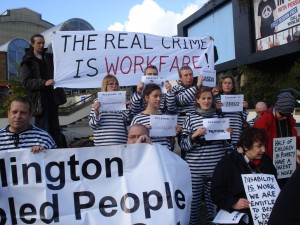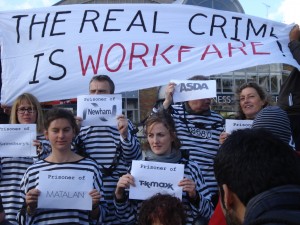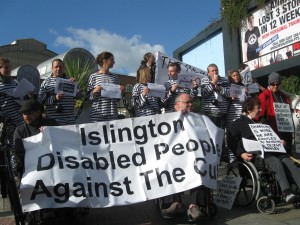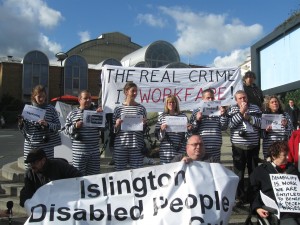Anti-poverty campaigners denied access to “welfare to work” conference
Posted: October 19th, 2011 | Author: admin | Filed under: Uncategorized | 2 Comments »Today, 19th October, anti-poverty campaigners from London Coalition Against Poverty (LCAP) were denied entry to the Welfare to Work conference. This despite the fact they had paid for 3 tickets two weeks in advance and that organisers had agreed to their attendance. Although event organiser, Matt Childs, had claimed they wanted to include people who will be affected by welfare reforms, apparently they were not prepared to discuss issues.
Conference staff justified their decision to exclude all three LCAP delegates from debate by saying that LCAP had previously organised protests against welfare reforms, and that one of them was arrested whilst taking part in a protest. Disclosure of this arrest history was inappropriately shared with the conference organisers and other delegates by a Sergeant of the Metropolitan Police (NI 92), in direct contravention to the Data Protection Act. Campaigners are concerned that this threatens legitimate democratic rights of protest and public debate about welfare reforms.
Meanwhile the Boycott Workfare coalition organised a colourful protest outside the event. Participants dressed as prisoners in a chain gang adorned with corporate logos to highlight that welfare reforms are rolling out forced labour for private companies in the UK, so big business “gets something for nothing”. An artist invited passers by to take part in her installation about mandatory work activity, paying them 3p a minute to undertake repetitive tasks based on the themes of gardening and litter-picking. This is the same rate as people forced to do workfare in the UK currently receive in benefits. Disabled people’s groups also took part in the protest. Their benefits are under threat, as the iniquitous medical assessments for Employment Support Allowance wrongly declare them fit for work and fast track them for workfare.
Damian Jackson, from London Coalition Against Poverty commented:
“We booked for this conference to hear what the industry, which is making millions from welfare privatisation, has to say. We wanted to make sure that the experiences of unemployed people and claimants were not entirely sidelined for profit.”
Joanna Long, spokeswoman for Boycott Workfare commented:
“Our protest today aimed to highlight that workfare schemes are not about getting people back to work: they are about plugging the gaps left by cuts to public services and boosting the profits of corporations. They displace blame for unemployment from both the government and the economy onto individual jobseekers. Workfare is part of an ideological attack on social security, which seeks to criminalise claimants whilst boosting business profits through what amounts to forced labour.”
This is not the first “welfare to work” conference Boycott Workfare has targeted. In June, Inside Government’s “Making Work Pay” conference was forced to relocate from the Royal Society at short notice in response to a Boycott Workfare demonstration.
Notes to editors
1. The demonstration was called by the Boycott Workfare coalition, which includes: Arts Against Cuts, Disabled People Against Cuts, London Coalition Against Poverty, Single Mother’s Self-Defence and others. The coalition calls on organisations to refuse to accept mandatory unpaid work placements from the job centre and “welfare to work” providers. The coalition intends to take direct action against those organisations which do accept workfare placements. See: http://www.boycottworkfare.org/
2. The conference was organised by GovNet Communications and brought together delegates who are involved in implementing the Work Programme and other welfare reforms. Speakers included James Purnell who helped introduce workfare for New Labour, as well as contributions from many of the companies to have been handed multi-million pound contracts to deliver the new government’s Work Programme. It is a key event in the “welfare to work” industry’s calendar, which campaigners see as highlighting the extent to which welfare provision has been privatised and social security eroded: http://www.welfaretowork-conference.co.uk/index.php
3. Recent welfare reforms give job centre advisers discretion to mandate people claiming Job Seekers Allowance (JSA) to undertake up to 30 hours’ unpaid work per week for a period of up to 4 weeks (see SSAC report below): equivalent to £2.25 per hour (based on JSA of £67.50 a week) or £1.78 per hour for someone under 25 years old (who receives £53.45 JSA a week). While these are meant to be of “benefit to the community”, the criteria for this include “working towards the profit of the host organisation”. There is nothing to prevent any 4 week period being extended and no guidelines on how many placements can be undertaken. This could mirror these 12 week+ Mandated Work situations:
http://www.whatdotheyknow.com/request/82746/response/218804/attach/html/2/FoI%202776%2017.10.11.pdf.html4. Workfare – work for your benefits – is also a component of the Work Programme which has handed private companies like A4E, G4S and SERCO arbitrary powers to make whatever it considers necessary for a claimant’s return to work mandatory. Campaigners are very concerned that claimants will be mandated into unpaid labour for large corporations, since many of these “welfare to work” providers established workfare schemes under the Flexible New Deal.
5. Workfare already existed under the Flexible New Deal, where companies like Poundland, Asda, Sainsburys and Primark have been able to benefit from unpaid labour: http://www.boycottworkfare.org/?page_id=16
6. The Social Security Advisory Committee’s report on 1 April was scathing about workfare – http://ssac.independent.gov.uk/pdf/MWA_report.pdf
- “Published evidence is at best ambivalent about the chances of ‘workfare’ type activity improving outcomes for people who are out of work.”
- “We are concerned that mandating an individual to this scheme could also have the opposite effect to the one intended.”
- “This seems to us to signal that being mandated to mandatory work activity is regarded as a punishment…”
7. The Welfare Reform Bill is now at Committee Stage in the House of Lords: http://services.parliament.uk/bills/2010-11/welfarereform.html



